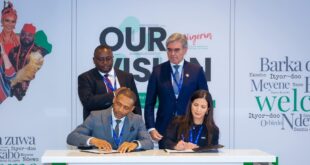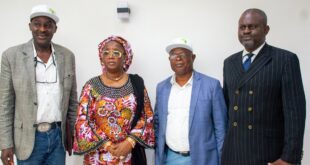The Mastercard Foundation Centre for Innovative Teaching and Learning in ICT has issued a Request for Proposals (RFP) inviting growth-stage, educational technology (EdTech) innovators to apply for an opportunity to grow their ventures while contributing to improving the quality of education in Africa. The deadline for submissions is November 21, 2019.
This is the first RFP to be offered by the Centre for Innovative Teaching and Learning in ICT located in Kigali, Rwanda. The Centre works with governments, EdTech developers, and other stakeholders to identify and eliminate the barriers facing young people pursuing secondary education in Africa. Selected EdTech companies will be supported for a minimum of 12 months and benefit from a comprehensive package that includes: customized mentorship, financial support, and the opportunity to test, validate and scale their business.
At a recent ministerial roundtable hosted by the Mastercard Foundation in Botswana, education ministers, African Union representatives, academics, young people, and EdTech entrepreneurs met to discuss how EdTech can improve outcomes for teachers and students. During these consultations, two priority areas emerged – professional development and enriched learning content. Innovators are invited to submit proposals that will either:
Enhance and increase accessibility and affordability of professional development for in-service teachers, which also minimizes their out-of-classroom time; or Create and deliver enriched learning content that improves quality, relevance, and accessibility to both in-school and out-of-school secondary school learners.
“Our aim is to create an active connection between those who need the solutions and those who create them,” said Joseph Nsengimana, Regional Director, Mastercard Foundation Centre for Innovative Teaching and Learning in ICT. “Solutions often do not consider the on-the-ground limitations from both a training perspective and the technical environment. We’re talking about co-creation every step of the way.”
Working with EdTech entrepreneurs and governments, the Centre for Innovative Teaching and Learning in ICT will support entrepreneurs and scale up their innovations. Eligible organizations must meet the following criteria:
A registered company that is now post-product with the potential to scale (typically in operations for two years or longer);
Company is majority African-led and/or owned;
A for-profit or non-for-profit operating model is in place;
The company is already operating in, or interested in moving into, the education market in Africa; and
The company’s product specifically addresses (a) the professional development of teachers; and/or (b) the need for enriched and accessible learning content for learners.
The Centre was established as part of the Mastercard Foundation’s Young Africa Works Strategy to enable 30 million young people to secure dignified and fulfilling work by 2030. Technology has the power to strengthen and improve how education is delivered across the continent, however, education technology entrepreneurs and implementers often struggle to grow and scale their solutions.
Access to quality education is often difficult, especially for young people living in rural and remote communities. While great strides have been made in access to primary education, only 43 percent of youth in Sub-Saharan Africa enroll in secondary education. Educational technology can be a digital bridge to those hardest to reach. For the vast majority of youth, secondary school is their springboard to employment or to entrepreneurship. In order to find work that provides a decent living, it is crucial that they are equipped with strong foundational, technical, and soft skills.
In addition to accessibility, secondary education systems in Africa suffer from a lack of qualified teachers, due in part to conflict, difficult working conditions, poor remuneration, and lack of support. Professional development will improve the quality of teaching among existing teachers, and it may revitalize the profession by providing teachers an opportunity to grow.
Does your organization have a solution that has the power to transform how secondary education is delivered, improving outcomes for young people across the continent? Learn more by clicking here.
Report distributed by African Media Agency (AMA) on behalf of The Mastercard Foundation.
About the Mastercard Foundation
The Mastercard Foundation seeks a world where everyone has the opportunity to learn and prosper. The Foundation’s work is guided by its mission to advance learning and promote financial inclusion for people living in poverty. One of the largest foundations in the world, it works almost exclusively in Africa. It was created in 2006 by Mastercard International and operates independently under the governance of its own Board of Directors. The Foundation is based in Toronto, Canada. For more information and to sign up for updates from the Foundation, please visit www.mastercardfdn.org. Follow the Foundation @MastercardFdn on Twitter.
 THE AFRICAN COURIER. Reporting Africa and its Diaspora! The African Courier is an international magazine published in Germany to report on Africa and the Diaspora African experience. The first issue of the bimonthly magazine appeared on the newsstands on 15 February 1998. The African Courier is a communication forum for European-African political, economic and cultural exchanges, and a voice for Africa in Europe.
THE AFRICAN COURIER. Reporting Africa and its Diaspora! The African Courier is an international magazine published in Germany to report on Africa and the Diaspora African experience. The first issue of the bimonthly magazine appeared on the newsstands on 15 February 1998. The African Courier is a communication forum for European-African political, economic and cultural exchanges, and a voice for Africa in Europe.






















